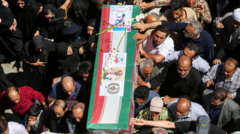Rafael Grossi, the IAEA's director, indicated that Iran is on the brink of resuming uranium enrichment within months, raising international concerns about nuclear proliferation.
Iran's Nuclear Potential: UN Chief Warns Enrichment for Bomb Possible Soon

Iran's Nuclear Potential: UN Chief Warns Enrichment for Bomb Possible Soon
A warning from the UN nuclear watchdog signals a serious escalation of Iran's nuclear capabilities following recent military strikes.
The head of the International Atomic Energy Agency (IAEA), Rafael Grossi, has issued a stark warning that Iran is poised to resume uranium enrichment, potentially leading towards the creation of a nuclear bomb, within a few months. His comments come in light of recent military strikes on Iranian sites by Israel and the United States, which Grossi claims caused severe but not complete damage to Iran's nuclear infrastructure.
In a recent interview, Grossi refuted claims made by former US President Donald Trump that Iran's nuclear facilities had been entirely obliterated, stating that "one cannot claim that everything has disappeared." Following a series of strikes on June 13 that targeted key nuclear and military sites, the extent of damage done remains unclear. Despite turmoil, Grossi noted that Iran maintains the necessary industrial and technological capabilities to resume enrichment activities at these sites.
Previous assessments, including one from the Pentagon, suggested that the military actions merely delayed Iran's nuclear program by a matter of months. Trump, however, has remained adamant, asserting that the attacks had been overwhelmingly successful while also hinting at the possibility of future military action if intelligence indicated Iran's uranium enrichment levels were concerning.
In the backdrop of this precarious situation, Iran's internal narrative about the strikes appears conflicting. While Supreme Leader Ayatollah Ali Khamenei claimed that the attacks bore little effect, Foreign Minister Abbas Araghchi described the damage as "excessive and serious." Complicating the matter further, Iran's parliament has moved to suspend cooperation with the IAEA, accusing it of favoring Israel and the US.
Iran's nuclear ambitions have brought it to a critical juncture, especially following the UN's report indicating violations of its non-proliferation obligations for the first time in two decades. Despite claiming that its nuclear program is exclusively for peaceful purposes, the reality is that Iran has been enriching uranium beyond the stipulated limits set in their 2015 nuclear deal following the US withdrawal from the agreement in 2018.
Under the original terms of the deal, Iran was restricted from enriching uranium above 3.67% purity, but since its collapse, the nation has progressively escalated enrichment activities, leading to the acquisition of enough 60% enriched uranium to theoretically construct nine nuclear weapons, according to IAEA estimates.
Looking ahead, Grossi expressed a continued hope for negotiations with Tehran, emphasizing the need for a diplomatic solution. "I have to sit down with Iran and look into this," he stated, underscoring that effective conflict resolution must transcend military action. As the international community watches closely, the potential for a renewed focus on diplomatic avenues to curb Iran's nuclear aspirations remains.





















